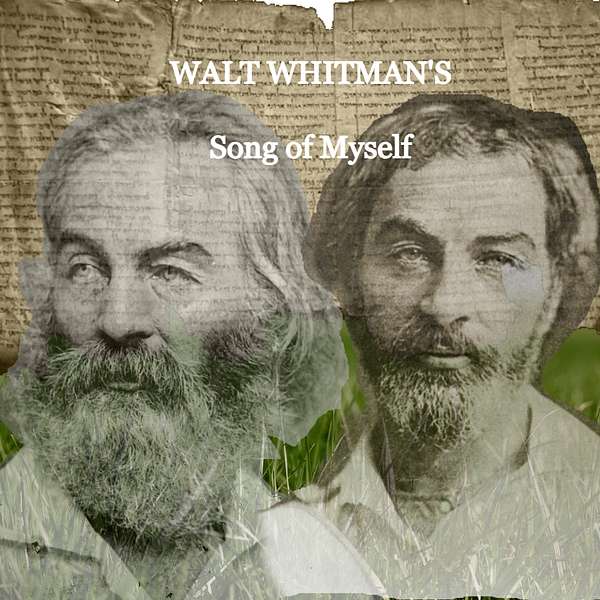
2centspnf
2centspnf
Song of Myself: Section 12 - The Butcher Boys and Blacksmiths
12
The butcher-boy puts off his killing-clothes, or sharpens his
knife at the stall in the market,
I loiter enjoying his repartee and his shuffle and break-down.
Blacksmiths with grimed and hairy chests environ the anvil,
Each has his main-sledge, they are all out, there is a great heat
in the fire.
From the cinder-strew’d threshold I follow their movements,
The lithe sheer of their waists plays even with their massive
arms,
Overhand the hammers swing, overhand so slow, overhand so
sure,
They do not hasten, each man hits in his place.
We departed from section 11’s scene with 28 young men and one woman resting in the water, the scene was jovial and carefree. Section 12 could be a look into the men’s professional lives and Whitman details the in’s and outs of a butcher and blacksmiths.
The butcher-boy is introduced to us in the act of “Putting off his killing-clothes” one can imagine how marred they are in blood, I’m particularly taken by the description of “killing clothes'' and how it compartmentalises the morality of his work as a butcher. It’s not wrong for a butcher to have killing clothes, because it's part of their job. The butcher-boy putting off his killing clothes could be a signal that the butchering with all its gore (debatable) is done, any ethics tied to that will not seep into other aspects of his day or life. Killing-clothes off, he heads over to his stall, presumably far/separate from where the “killing” takes place, and sharpens his knife. Whitman hangs around the butcher-boy enjoying his company and engaging in repartee or banter as he observes the butcher-boy's “shuffle and breakdown”. This illustrates the butcher-boy's process as he goes about his work; it starts off with a little bit of a scuff then breaks down into a clearer system. I don’t know much about butchering, but I can relate this process to my experience with cutting up chicken. So I have experience with regular broiler chicken and cornish chicken which tends to have tougher meat and is much slender than the former. These differences cause me to have a different approach when cutting them up, such is the shuffle, then there’s the breakdown when I go into recognising where to cut off certain portions, from then on it becomes systematic. Another analysis related the shuffle and breakdown to Black American culture which has produced dances that go by those names. In a way the butcher-boys work flows like a dance, and an aggressive one at that.
We are then brought to a scene of Blacksmiths engaged in their craft. Grimed and hairy-chested they environ the anvil. I had known the word environ to mean the environment, but an analysis found the word iron in environ which is the material blacksmiths work with. Looking at the prefix ‘en-’ when referring to nouns and verbs it means to put into or on, perhaps Whitman is illustrating how the blacksmiths work with iron with this play on words they “environ the anvil”. The speaker continues;
Each has his main-sledge, they are all out, there is a great heat
in the fire.
From the cinder-strew’d threshold I follow their movements,
The lithe sheer of their waists plays even with their massive
arms,
Here Whitman details the process of blacksmithery, the men have their sledgehammers then we are redirected to the great heat in the fire and then from the cinder-strew’d threshold Whitman follows their movements closely. He describes the lithe sheer of their waists, which plays even with their massive arms, here he pairs the grace and agility of their torsos as they position themselves to swing their hammers with the bulkiness and rigour of their massive arms. The next line reads
Overhand the hammers swing, overhand so slow, overhand so
sure,
I propose the repetition of overhand to be Antanaclasis- is a rhetorical device in which a phrase or word is repeatedly used, although the meaning of the word changes each time it is repeated.
This line fragments the blacksmith's overhand into three phases;
- Overhand the hammers swing- here is an emphasis on the tools utility and intensity
- Overhand so slow- we are now drawn to the pace of the overhand whose slowness denotes precision or attentiveness
- Overhand so sure- Here the overhand is followed by a sign of expertise
Overhand the hammers swing, overhand so slow, overhand so
sure,
The section ends with the line;
They do not hasten, each man hits in his place
Once again denoting experience or expertise as well as a care for their craft which Whitman appreciates. His attentiveness to the work of the butcher and the blacksmiths reinforces his reputation of being the common man's poet.